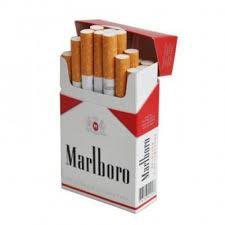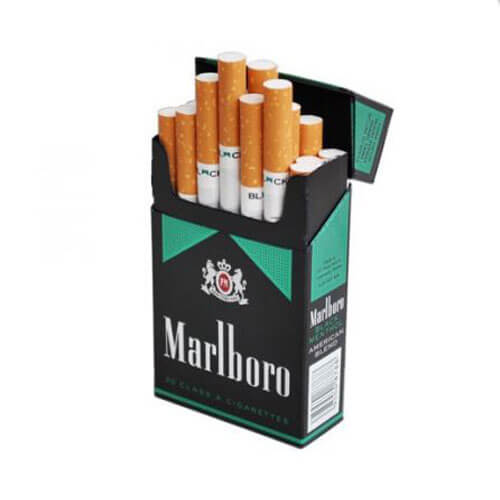Marlboro Cigarette

Marlboro is an American brand of cigarettes, currently owned and manufactured by Philip Morris USA within the United States, and by Philip Morris International outside the United States
History
Philip Morris, a London-based cigarette maker, opened a New York subsidiary in 1902 to sell many of its cigarette brands. The mark "Marlboro" was registered in the United States in 1908 although no cigarette was marketed under this name until 1923. In 1924, the brand was launched. They are first marketed as "America's luxury cigarette" and were mainly sold in hotels and resorts.
Around the 1930s, it was starting to be advertised as a women's cigarette, based on the slogan "Mild As May". The name was taken from a street in London where Philip Morris's British factory was located. However, as early as 1885, a brand called "Marlborough" was already being marketed as a "ladies' favorite" by Philip Morris & Co.
In the 1930s, advertising for the cigarette was primarily based on how ladylike the filter cigarette was, in an attempt to appeal to the mass market. To this end, the filter had a printed red band around it to hide lipstick stains, calling it "Beauty Tips to Keep the Paper from Your Lips".
Shortly before the World War II, the brand's sales stagnated at less than 1% of tobacco sales in the U.S. and was briefly withdrawn from the market. After the war, Camel , Lucky Strike and Chesterfield were the only common cigarettes.
After scientists published a major study linking smoking to lung cancer in the 1950s, Philip Morris repositioned Marlboro as a men's cigarette in order to fit a market niche of men who were concerned about lung cancer. At the time, filtered cigarettes were considered safer than unfiltered cigarettes, but had been until that time only marketed to women. Men at the time indicated that while they would consider switching to a filtered cigarette, they were concerned about being seen smoking a cigarette marketed to women.
The red and white package was designed by the designer Frank Gianninoto. The emblem is placed on top of the pack and has the popular Latin expression Veni, vidi, vici ("I came; I saw; I conquered"), authored by Julius Caesar. The repositioning of Marlboro as a men's cigarette was handled by Chicago advertiser Leo Burnett. The proposed campaign was to present a lineup of manly figures: sea captains, weightlifters, war correspondents, construction workers, etc. The cowboy was to have been the first in this series. While Philip Morris was concerned about the campaign, they eventually gave the green light.
Marlboro's market share rose from less than one percent to the fourth best-selling brand. This convinced Philip Morris to drop the lineup of manly figures and stick with the cowboy, later known as the Marlboro Man. From 1963, the television advertisements used Elmer Bernstein's theme from The Magnificent Seven.
In the late 1960s, Marlboro "Longhorn 100's" were introduced. Although colour-coded with gold, they were full flavor cigarettes, not lights. In 1972, Marlboro became the best-selling brand of tobacco in the world.
In order to comply with a 2006 court ruling in United States v. Philip Morris USA, Inc., et al.,[12] Philip Morris (and all other cigarette companies) is now prevented from using words such as "Lights", "Ultra-Lights", "Medium", "Mild", or any similar designation that yields a false impression that they are safer than regular full flavour cigarettes. Thus Marlboro and other cigarette companies must use only color-coding instead; for example, Marlboro Lights are now called Marlboro Gold Pack.
Philip Morris responded to the popularity of Pall Mall, the number three brand, by pushing Marlboro Special Blends, a lower-priced cigarette.
In 2013, Philip Morris International introduced "Marlboro 2.0". The pack design was changed; the dark red was replaced with a lighter red, the "Marlboro" and Philip Morris logo became ribbed and transparent, and around 2017 a special "SmartSEAL" was introduced to keep the stored cigarettes longer fresh, the Marlboro 2.0 packs are mainly available in Europe and some parts of Africa, Asia and Latin America, but not in the United States, Canada, Australia (due to plain packaging) and New Zealand.
In 2015, Philip Morris announced they would introduce a "Firm Filter" to their Marlboro Red, Gold, Silver Blue, Ice Blast and White Menthol variants. Philip Morris managing director for the U.K. and Ireland, Martin Inkster, said that the Firm Filter technique was added to "offer quality you can feel, and it is a cleaner way to stub out your cigarette".
In 2016, the volume of produced cigarettes outside of the United States and China was 282 billion.

